Unknown person linear seating arrangement for bank clerk prelims pdf is available here. The unknown linear puzzle is frequently asked in the bank clerk prelims exams. You can expect around 3 to 5 marks from the unknown linear puzzle questions. If you practice well, you can quickly solve the unknown linear seating puzzle questions. On continuous practice, you can gain speed and accuracy. So, practice more using the Unknown person linear seating arrangement for bank clerk prelims pdf. Here we have provided unknown linear puzzle questions of various models. So, practice in a daily manner and gain speed and accuracy to solve the puzzle quickly.
What is an Unknown person linear seating arrangement? – In this question, the number of persons will not be disclosed. You have to find the number of persons and also their seating arrangement order. Practice more Unknown person linear seating arrangement for bank clerk prelims. So, you can learn more tricks to solve the unknown linear puzzle.
Banking & Insurance Exam Study Materials
How to Solve Unknown Linear Puzzle?
Here we have discussed some important tips to solve the missing number series questions.
- Start with the clue that has more connectors.
- Go with possibilities.
- Eliminate the wrong possible case.
- Find the number of persons in the arrangement and start to answer the questions.
So, candidates practice well using the Unknown person linear seating arrangement for bank clerk prelims pdf.
Directions (1-5): Study the following information carefully and answer the below questions.
A certain number of persons are sitting in the linear row facing the north. V sits sixth to the right of P. The number of persons sits between V and P is one more than the number of persons sits between V and M. I sits second to the right of M. Only one person sits between I and T. J sits second to the left of P. V and T are not immediate neighbours. The number of persons sits between M and T is the same as the number of persons sits between X and J. X sits to the left of J.
1) How many possible number of persons are sitting in the row?
a) 22
b) 24
c) 20
d) 21
e) 19
2) How many seats are between J and I?
a) 16
b) 12
c) 13
d) 15
e) 14
3) Who among the following person sits at the right end of the row?
a) The one who sits second to the right of I
b) M
c) The one who sits fourth to the right of V
d) I
e) P
4) What is the position of V from the right end?
a) Sixth
b) Seventh
c) Eighth
d) Tenth
e) Ninth
5) What is the position of J from the left end?
a) Sixth
b) Seventh
c) Eighth
d) Tenth
e) None of these
Directions (6-10): Study the following information carefully and answer the below questions
A certain number of persons are standing in the linear row facing the north direction.
V stands third to the left of G. Only three persons stand between V and P. G stands exactly in the middle of V and Q. N stands fifth to the left of P and stands at the end. The number of persons stands to the left of V is one more than the number of persons stand to the right of Q. The number of persons stands to the left of N is the same as the number of persons stand to the right of L. I stands exactly in the middle of Q and L. More than five persons stand between P and L.
6) How many persons are standing in the row?
a) 21
b) 22
c) 24
d) 25
e) 20
7) Who among the following person stands fifth to the right of V?
a) L
b) The one who stands fourth to the left of I
c) The one who stands fourth to the left of L
d) No one
e) N
8) What is the position of V from the left end?
a) 9th
b) 13th
c) 12th
d) 11th
e) 10th
9) How many persons sit between N and P?
a) 1
b) 2
c) 4
d) 5
e) 0
10) What is the position of G with respect to V?
a) second to the left
b) second to the right
c) third to the right
d) third to the left
e) none of these
Try Seating Arrangement Questions Online Mock Test
Answers :
Directions (1-5) :

We have,
- V sits sixth to the right of P.
- The number of persons sits between V and P is one more than the number of persons sits between V and M.
From the above condition, there are two possibilities.
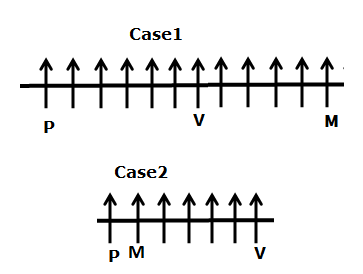
Again we have,
- I sits second to the right of M.
- Only one person sits between I and T.
- J sits second to the left of P.
- V and T are not immediate neighbours.
From the above condition, Case2 gets eliminated.
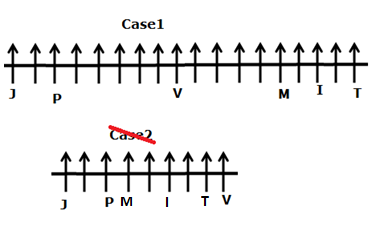
Again we have,
- The number of persons sits between M and T is the same as the number of persons sits between X and J.
- X sits left of J.
From the above condition, case1 shows the final arrangement.

1) Answer: A
2) Answer: E
3) Answer: A
4) Answer: D
5) Answer: E
Directions (6-10) :

We have,
- V stands third to the left of G.
- Only three persons stand between V and P.
From the above condition, there are two possibilities.
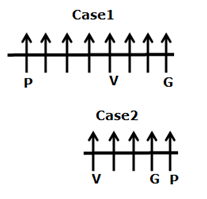
Again we have,
- G stands exactly in the middle of V and Q.
- N stands fifth to the left of P and stands at the end.
- The number of persons stand to the left of V is one more than the number of persons stand to the right of Q.
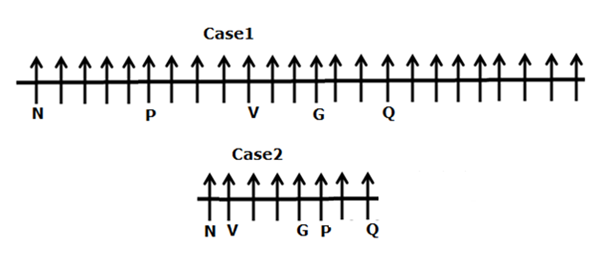
Again we have,
- The number of persons stand to the left of N is the same as the number of persons stand to the right of L.
- I stands exactly in the middle of Q and L.
- More than five persons stand between P and L.
From the above condition, case2 gets eliminated. case1 shows the final arrangement.
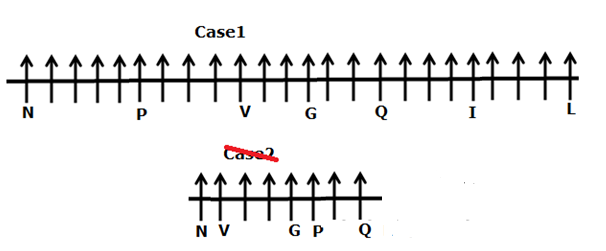
6) Answer: C
7) Answer: D
8) Answer: E
9) Answer: C
10) Answer: C





